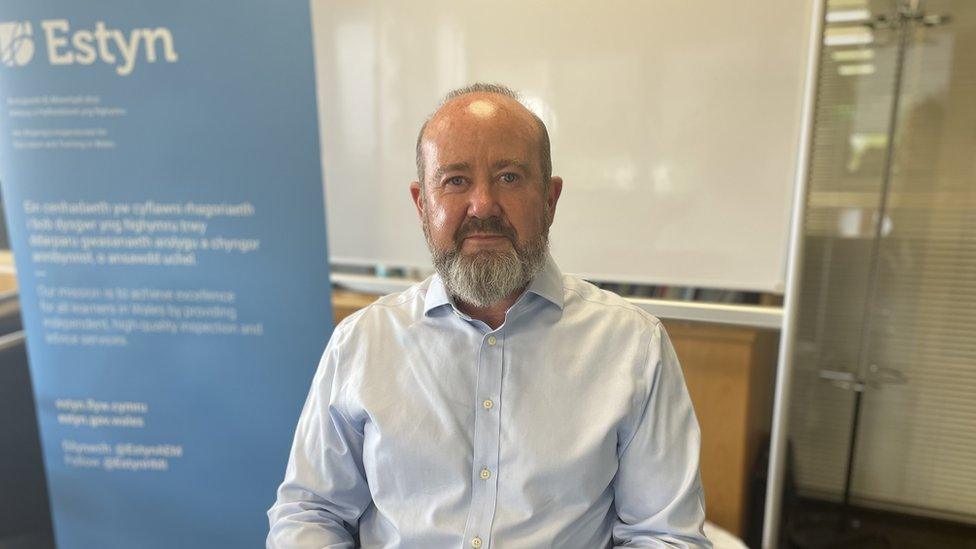Estyn: Sexual harassment common at Welsh colleges, report finds
- Published

The "prevalence of incidents is high" with peer-on-peer sexual harassment at Welsh colleges, says the Estyn report
The sharing of explicit images has become "commonplace" at Welsh colleges, the education watchdog has revealed.
An Estyn report said college leaders in Wales did not have a "clear picture of the extent of sexual harassment" among students.
It said fear of not being taken seriously was among the reasons students tended not to report incidents.
The Welsh government said any form of sexual harassment was unacceptable.
Estyn's report was written in response to requests by the education minister and the Senedd's children, young people and education committee.
The inspectorate visited all 12 further education colleges in Wales to interview staff and pupils and carried out an online questionnaire.
It found peer-on-peer sexual harassment among 16-18-year-olds was "complex and widely under-reported".
It said female students considered messages about explicit images to be "nothing out of the ordinary".
The watchdog said colleges needed to "engage more effectively" with students.
"The prevalence of incidents is high, with most learners recognising many examples of sexual harassment as behaviour they had either witnessed or experienced personally," the report said.
Some female students told Estyn they did not report incidents because they felt that the behaviour of perpetrators "may be trivialised or excused".
'Fear of embarrassment'
Other reasons given for not reporting incidents included feeling that such behaviour had "become normalised" and a "fear of embarrassment".
Estyn found that there had been "a substantial upward trend" in the number of incidents being reported post-Covid.
College leaders said this could be down to increasing awareness among students of what constitutes sexual harassment.
But staff members also said the pandemic had affected the development of students' social skills.
Estyn also reported a "concerning trend" where a small number of male students adopted "the sexist and misogynistic attitudes and beliefs of online influencers".
A staff member told Estyn: "There have been instances of male learners making overtly sexual comments about female staff within earshot and there need to be ways of combating that."
Estyn found that, while staff "lacked confidence" in addressing sexual harassment issues, the "most serious cases" were dealt with "effectively" by colleges.
'Much more needs to be done'
Estyn chief inspector Owen Evans said: "All learners deserve to feel safe. This latest report highlights that much more needs to be done to help protect and support 16-18-year-old learners in Welsh colleges."
The report called on the Welsh government to "provide appropriate guidance to colleges".

Estyn head Owen Evans says "much more needs to be done" to support students facing sexual harassment
A Welsh government spokesperson said: "Any form of sexual harassment is unacceptable and the safety of learners is our priority."
The spokesperson said the Welsh government was putting funding towards resources, professional learning and research.
Colleges Wales chief executive David Hagendyk said: "It is absolutely unacceptable that learners face any form of harassment. While good practice in the sector has been identified, the report rightly highlights the need for improvements.
"All colleges are committed to doing this and we will work with them to implement the recommendations in the report."
Related topics
- Published10 February 2022

- Published10 March 2022

- Published24 April 2023

- Published20 May 2021

- Published17 September 2019
